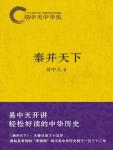Chapter 1 Chapter 1 The First Emperor's Revolution
The Great Qin Empire sank like the Titanic, very quickly and without discussion, just like when they were born out of nowhere.
Please see the timetable -
In 230 BC, Qin conquered Han.
In 228 BC, Qin destroyed Zhao.
In 225 BC, Qin destroyed Wei.
In 223 BC, Qin destroyed Chu.
In 222 BC, Qin destroyed Yan.
In 221 BC, Qin destroyed Qi and Yingzheng proclaimed himself emperor.
In 210 BC, Qin Shihuang died and Qin II was established.
In 209 BC, Chen Sheng and Wu Guang revolted.
In 207 BC, Qin lost the title of Emperor and changed his name to King Qin.
In 206 BC, Qin Dynasty died.
That is to say, it took Qin only nine years to turn from a kingdom to an empire; it took less than fifteen years from proclaiming emperor to being destroyed.
Such an ending, I am afraid Qin Shihuang did not expect it.
In fact, Yingzheng is full of confidence in his empire.His self-confidence is unquestionable in the first imperial edict after proclaiming himself emperor.
The content of the edict is to abolish the posthumous title system.
The so-called posthumous title is a coffin-defining title given to ancient Chinese monarchs, nobles, and celebrities after their death, such as Ping for King Ping, Wen for Duke Wen, and Xiang for Xiangzi.With a posthumous title, this person has a historical evaluation.The best are Wen and Wu, but those called "Ling" are not effective.Duke Ling of Jin, Duke Ling of Zheng, Duke Ling of Chen, and King Ling of Chu in the Spring and Autumn Period all died by accident.
History always has value judgments, even if they are euphemistic and obscure.
However, Qin Shihuang disagreed.Because the monarch's posthumous title cannot be decided by himself during his lifetime, it can only be decided by others after his death.Therefore, Yingzheng believes that this is "the son discusses the father, and the minister discusses the emperor", which is very undesirable.
The problem is that the posthumous title also has another function, that is, it can distinguish monarchs of different generations.For example, in Zhou Dynasty, King Wen was followed by King Wu, King Wu was followed by King Cheng, and King Cheng was followed by King Kang.If they were all called King Zhou, then no one would know who was who.
Similarly, without posthumous titles, are all the emperors of Qin called Qin Huang?When later generations read history, how can they figure it out?
Qin Shihuang had his own way.He said--
It's a good one "as for all generations, it will be passed on endlessly".It seems that he never thought that the Great Qin Empire would die one day.
But how?
The second generation died.
In fact, in the second year of Qin II's succession to the throne, Chen Sheng and Wu Guang reversed.As soon as the flag of the rebel army was raised, the whole world gathered to respond, and the spark instantly started a prairie fire.Two years later, Zhao Gao, Prime Minister of Qin, murdered the second emperor, and made Ziying the king of Qin.In other words, after only fourteen years of prosperity, Great Qin plummeted, turning from an empire into a kingdom again.What's even more tragic is that Qin, who was downgraded to a kingdom, did not survive, and Ziying soon surrendered to Liu Bang.This pitiful king of subjugation has actually only been the king of Qin for forty-six days.
One month after Ziying surrendered, Xiang Yu led a coalition of princes into Qin.He broke in like a wild boar, plundered treasures, captured beauties, burned palaces, slaughtered Xianyang, killed children and babies, and wiped out the Qin clan.Then he divided up the world, called himself Overlord, and his capital was in Pengcheng, known as "Western Chu" in history.The original Qin Kingdom was split into three feudal areas, which were enfeoffed to three Qin generals, known as "Three Qins".
A huge empire fell apart like this.Even the posthumous title system, which was abolished by Qin Shihuang, was restored in the Han Dynasty and continued until the end of the Qing Dynasty.The Wu of Emperor Wu of the Han Dynasty and the offering of Emperor Xian of the Han Dynasty are posthumous titles.
This is really eye-popping.
Think back then, how invincible Qin was!In 241 BC, Chu State took the lead and formed a five-nation coalition army with Zhao, Wei, Han, and Wei. With King Kaolie as the commander-in-chief and Lord Chunshen as the chief of staff, they jointly attacked Qin.The coalition troops came to Hangu (in today's Lingbao City, Henan Province), ready to break in aggressively.The Qin people remained calm and turned on and off to meet the enemy, but the Allied Forces of the Five Nations were so frightened that they left without a fight.The people of Qin did nothing, and all countries became lambs to be slaughtered.
Now, how vulnerable Qin is!Xiang Yu, who slaughtered the city, was no more than a warrior; Chen Sheng, the leader of the righteous, was no more than a soldier; Liu Bang, who was surrendered, was no more than a small pavilion chief of the empire.In the Qin Dynasty, there is one pavilion for ten miles, and one township for ten pavilions.The head of the pavilion was a "share-level cadre" lower than the head of the township, but he replaced Qin Huang and became the first emperor of the new empire.
Is there no historical mystery in this?
If so, what is it?
Notes:
Notes:

